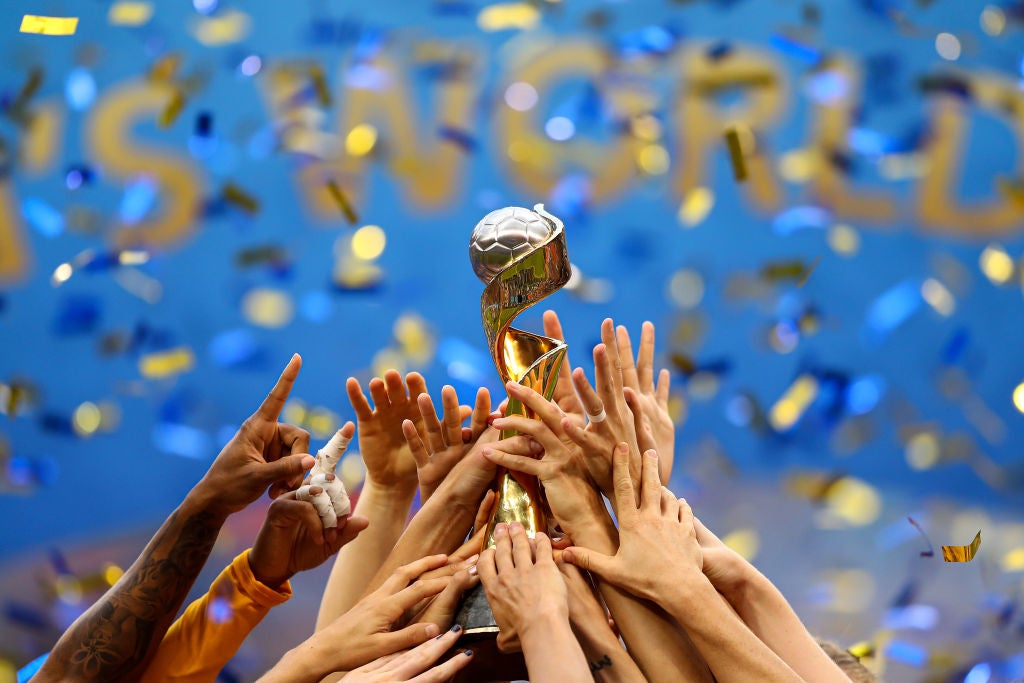Women’s World Cup faces ‘betrayal’ of European TV blackout
With almost 50 days to go until the start of the tournament, offers from some major European countries are as little as 1 per cent of the price agreed for the men’s World Cup
Your support helps us to tell the story
From reproductive rights to climate change to Big Tech, The Independent is on the ground when the story is developing. Whether it's investigating the financials of Elon Musk's pro-Trump PAC or producing our latest documentary, 'The A Word', which shines a light on the American women fighting for reproductive rights, we know how important it is to parse out the facts from the messaging.
At such a critical moment in US history, we need reporters on the ground. Your donation allows us to keep sending journalists to speak to both sides of the story.
The Independent is trusted by Americans across the entire political spectrum. And unlike many other quality news outlets, we choose not to lock Americans out of our reporting and analysis with paywalls. We believe quality journalism should be available to everyone, paid for by those who can afford it.
Your support makes all the difference.The Women’s World Cup continues to face a TV blackout in Europe this summer, as some of the biggest football countries have yet to agree broadcast deals for their markets with almost 50 days to go before the tournament begins in Australia and New Zealand.
Figures within the sport feel that the offers so far have been so derisory that they represent a “betrayal” of supposed commitments to the women's game, that could affect its growth and future deals.
While the United Kingdom deal with the BBC and ITV is close to an agreement, that is not yet the case with France, Spain, Germany, Italy or Japan.
Despite booming interest in the women’s game in all of these territories, none of the offers have yet reached even 6 per cent of the price agreed for the men’s World Cup in 2022. In Italy, it has been as low as 1 per cent and in Germany under 3 per cent.
While the argument from broadcasters, including Italy’s RAI and Germany’s ZDF and ARD, has been that the games are on at unappealing times due to taking place in New Zealand and Australia, Fifa’s response has been that this doesn’t really wash.
The global governing body has first of all pointed to how healthy European figures for the men’s World Cup in Japan and Korea in 2002, which had similar scheduling.
There is then the fact that virtually all the matches involving European nations take place after 9am in their time zone, with many coming at midday, while also coming in the school summer holidays.
However, Fifa’s initial inspection report of the Australia and New Zealand bid did warn that "a relative fall in audiences could be experienced in Europe" due to the kick-off times.
Fifa have since pointed to how much more family-oriented the women’s game demographic is, which is why its timing is well suited to the many children who will be invested. There is also a broader consideration, with Fifa feeling they are standing up for what’s fair.

It has been pointed out to broadcasters that it is not like they are asking for 20 per cent of the men’s amount, but that if they agree to under 5 per cent - or, in the worst cases, 1 per cent - it will set a damaging trend for future negotiations.
This all comes amid a wider debate about equal pay, with Fifa intending to commit to that by 2027. The governing body’s prize money has been increased for this tournament to £152m, a three-fold increase from France 2019 and 10-fold increase from Canada 2015. The total prize money at the men’s World Cup in Qatar was £371m.
While Fifa could dip into its considerable reserves, one argument is that the Covid crisis showed the necessity of keeping this substantial, especially when it was required to prop up so many national associations during that period. That directly staved off the cutting of underage or women programmes that tends to happen when federations encounter financial difficulties.
Fifa have told broadcasters they need to “step up” in this regard, especially since so many reap the benefits when advertising their own commitment to the women’s game.


Join our commenting forum
Join thought-provoking conversations, follow other Independent readers and see their replies
Comments